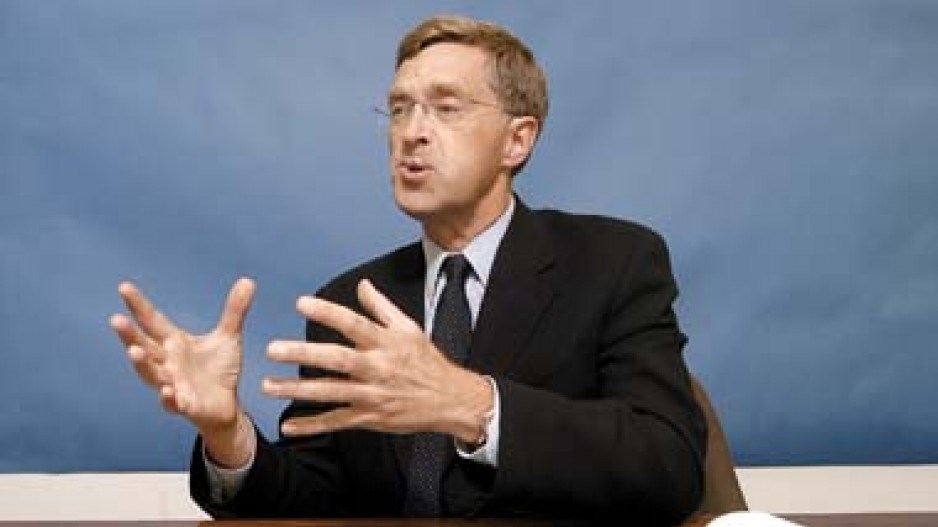Former B.C. attorney general and treaty minister Geoff Plant is heading the B.C. government's legal team at the joint review panel's hearings into the $6 billion, 1,172-kilometre Northern Gateway pipeline proposal. Plant's job is to ensure the plan meets B.C.'s five conditions. The hearing's questioning phase began two weeks ago in Prince George and will conclude November 9, then resume in Prince Rupert. Plant spoke to Business in Vancouver about the concerns his team has over the proposal.
Q&A
Q: Environment Minister Terry Lake said last week that his government is not satisfied with the answers you're getting from the proponent, Enbridge Inc. (TSX:ENB). What answers are you not getting?
A: We're asking questions that are important – like terrain stability, leak detection systems – and what is appearing consistently in the answers is that, while Enbridge has done some work on these issues, they have not done all the work we think ought to have been done. Their answer is: "We'll do this work later."
Q: By Enbridge's own estimates, its oil spill in Michigan's Kalamazoo River could cost more than $700 million to clean up. How much does Enbridge have as a cleanup contingency fund, in the event of a spill?
A: As I understand it, none. They will have insurance. They do not know how much insurance they will have because they have not yet approached the market, but some numbers provided in their earlier information about potential coverage limits were below the Kalamazoo figure. It's also relevant that it's Northern Gateway Pipeline [the separate company that will be the proponent if the pipeline goes ahead] that will be liable, not Enbridge. Enbridge does not intend to indemnify Northern Gateway in respect of any claims against it, which may exceed the value of its assets or the pipeline income.
Q: Can this project go ahead without B.C.'s consent?
A: The fundamental regulatory authority for interprovincial pipelines is federal. The province has lots of constitutional authority, and it can exercise that authority in ways that can have a real impact on the viability of the pipeline. If the province decides that it will do everything it can to stop the pipeline, then I expect there'll be a legal challenge.
Q: The BC Chamber of Commerce supports the pipeline as do several unions. What do you say to those who fear a project worth $1 billion to B.C. could be jeopardized by political posturing in an election year?
A: Park the politics. Now tell me what's wrong with the five conditions? I don't think there's any politics in asking of the proponent that it demonstrate world-leading marine and land oil-spill prevention, response and recovery systems. Based on the last few days of questioning, Enbridge is not getting any closer to satisfying those five conditions with the answers [it's] been providing so far.
Q: What commitments are you not getting from Enbridge?
A: Enbridge has built lots of pipelines. It's a world-class pipeline company. There are lots of pipelines in British Columbia, so what's the big deal? This is a pipeline project unlike any other pipeline project, at least for British Columbians. And what I don't see, so far, in the evidence that has been revealed at these hearings, is any recognition, really, by Enbridge of that fact. It's not clear to me yet how they've gone the extra mile that I think they have to [go] in order to build public support.
Any time I hear "this is what we typically do," that, to me, raises the question: what is it about this project that [makes you think] what you typically do is going to be good enough? And that is more acutely so in the aftermath of the Kalamazoo problem.
Q: Enbridge has claimed 60% of First Nations along the pipeline corridor have signed equity agreements, yet not one First Nation has publicly declared support for the project. Can this go ahead without First Nation co-operation and consent?
A: I don't know that consent is an absolute requirement. But some kind of constructive engagement seems to be to be pretty important, if Enbridge wants to do this without facing a whole series of lawsuits from First Nations.
Q: Some observers say this project is dead already. Are these hearings just going through the motions?
A: It doesn't sound that way to me, when I hear the Enbridge witnesses give evidence. There are people who have shut the door conclusively on this project, who appear to have decided they know everything they need to know, but that's not what the province is saying. We are saying, "We need to know more." While B.C. is expressing some pretty serious concerns, the province, I think, also still has an open mind about whether Enbridge could persuade the government and people of B.C. that this is going to be the safest possible pipeline. •




